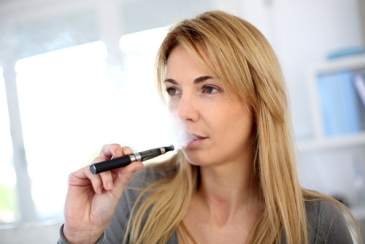City Council Approves E-Cigarette Restrictions
By Chuck Sudo in News on Jan 16, 2014 5:00PM
As expected, City Council rubber-stamped a Mayor Emanuel-backed ordinance that would treat electronic cigarettes in the same manner as traditional cigarettes Wednesday. The ordinance, which passed by a 45-4 vote, would prohibit vaping enthusiasts from using their e-cigs indoors and treat vaping products in the same manner as tobacco products under the Smoke-Free Illinois Act. So the vote indicated the debate over the ordinance a couple days earlier was mainly for show.
Emanuel was in Big Nanny mode after the vote:
"I do not think we should wait on the FDA," Mayor Rahm Emanuel said after the vote. "Adults' ability to get the product won't be restricted. Children's ability to get the product will be restricted."
But Emanuel's positioning the ordinance's passage as a win against Big Tobacco didn't sit well with NJoy, one of the leading e-cig manufacturers. They said the vote would only drive people toward cigarettes:
This vote lacks any scientific basis and reflects a clear misunderstanding on the part of the City Council of the serious unintended consequences to public health that their actions will cause. Make no mistake: This will only benefit Big Tobacco, and is a step backward in the fight against the tobacco epidemic. Today, Big Tobacco has no greater ally than supporters of initiatives like this one. With as many as 43 million smokers remaining in the United States and over 420,000 of them expected to die prematurely in the coming year, it is paramount that we not confuse an increasingly effective solution that gives smokers an alternative to toxic and deadly combustible tobacco cigarettes with the problem of tobacco cigarette smoking. History and science will judge harshly those who abandon science, undermine the public health and prolong the tobacco epidemic.
Scientific research has not indicated whether vaping is harmful to the vapers themselves or people around them, but NJOY may have a point. The United States Centers for Disease Control and Prevention reported last September that vaping use has doubled among high school students from 2011 to 2012; 80 percent of those surveyed indicated they also smoked.
Another report conducted by the Department of Health Behavior at the Roswell Park Cancer Institute in Buffalo, New York and published in Nicotine and Tobacco Research indicated that people standing next to someone using an e-cigarette would be exposed to nicotine but not the chemicals usually found in cigarette smoke. (Cue the "It's water vapor" cries now.)
The aldermen who voted against the ordinance—Roderick Sawyer (6th), Rey Colon (35th), Nick Sposato (36th) and Brendan Reilly (42nd)—cited the lack of scientific evidence and noted the e-cig regulations may not lead smokers to the devices as a cessation method. Emanuel countered that since many of the vaping devices are sold by tobacco companies they should be regulated the same as tobacco products.
"Tobacco use in this country has flattened, so the tobacco companies are trying to figure out how to get more users so they're targeting our most vulnerable population which is our children. Any one of us are here to protect our children."
